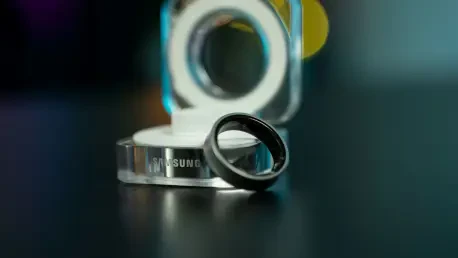As the digital health market continues to burgeon, tech companies are perpetually pushing boundaries, striving for products that redefine user interaction with technology. With the introduction of the FreeSense Ring, Acer steps into the health-tracking arena, taking its innovative prowess to a new dimension. This unveiling at Computex in Taipei has piqued interest with its promise to revolutionize how individuals monitor their health. The hardware’s cutting-edge features and seamless AI integration suggest a promising future for health technology, positioning Acer prominently within a competitive landscape.
Built for Precision and Style
The Technological Edge of the FreeSense Ring
Acer’s FreeSense Ring touts advanced health monitoring capabilities, marking its entrance with features that promise precise data collection and a user-friendly experience. The ring showcases its excellence with a titanium alloy construction known for its durability and sleek aesthetics. What sets it apart is its comprehensive sensor suite, capable of measuring metrics such as heart rate, heart rate variability, and blood oxygen levels. Furthermore, the device offers insights into sleep patterns, a feature increasingly sought after in a health-conscious consumer base.
Empowered by AI, the ring uses a sophisticated algorithm that processes health data through its companion app, setting a new standard in personalized wellness technology. This integration minimizes the need for additional subscriptions, particularly appealing to consumers seeking cost-effective health solutions. By focusing on delivering precise and comprehensive health insights, Acer aims to carve a niche in an already crowded market, vying for attention alongside contenders like the Oura Ring 4 and Samsung Galaxy Ring. The AI technology facilitates instantaneous data analysis, translating raw numbers into actionable health insights, allowing users to make informed lifestyle choices.
Design and Durability Features
Beyond its advanced functionalities, the FreeSense Ring captivates consumers with a design philosophy that blends style with robustness. Available in seven distinct sizes and two color options, Black and Rose Gold, the device caters to a diverse user base concerned with both fashion and functionality. Its IP68-rated dust and water resistance, coupled with a 5ATM rating, ensures reliable performance up to depths of 50 meters. This builds a narrative of resilience, making the ring suitable for any lifestyle, whether sedentary or physically active.
Acer’s design strategy focuses not only on aesthetic appeal but also on delivering durability, an essential aspect for wearables expected to withstand daily rigors. The titanium alloy ensures a lightweight yet durable build, while the ergonomic design enhances user comfort. This synthesis of form and function reassures potential users of the ring’s reliability, promising a device that does not compromise on style or technological prowess. With all these design elements, the FreeSense Ring is poised to resonate with both tech-savvy individuals and those new to digital health solutions.
Broader Market Implications
Competing in the Smart Wearables Market
Acer’s introduction of the FreeSense Ring enters a dynamic market characterized by rapid innovation and fierce competition. As smart wearables become integral to everyday health management, companies must continuously evolve to cater to increasingly sophisticated consumer needs. The FreeSense Ring not only complements existing products in Acer’s lineup but signifies the company’s strategic shift toward health-centric digital solutions. Competing against established players like Samsung and newer entrants alike, the ring’s unique proposition lies in its blend of technology, style, and affordability.
Acer’s entry into the health tech space underscores a broader trend where traditional tech companies are venturing into health and wellness domains. The sector offers fertile ground for innovation, leveraging advances in AI, miniaturization, and mobile connectivity to empower users with real-time health data. This convergence of technology and health is reshaping the landscape, creating a holistic avenue for managing personal well-being. As companies strive to carve out space in this lucrative market, the focus remains on delivering reliable, personalized, and user-friendly health tools.
Future Considerations and Potential Impact
As the digital health market rapidly expands, tech companies are consistently exploring new frontiers, aiming to create products that transform how users interact with technology. Acer, with the launch of the FreeSense Ring, has made a notable entry into the health-tracking sector, demonstrating its innovative capabilities on an elevated platform. This introduction at Computex in Taipei has sparked substantial interest, primarily due to its potential to reshape the ways in which individuals track and manage their health. Designed with state-of-the-art features and seamless AI integration, the FreeSense Ring signifies a bright future for health technology, positioning Acer as a significant player within this highly competitive industry. By blending advanced technology with user needs, Acer’s entrance into this domain not only emphasizes the company’s commitment to innovation but also highlights its strategic adaptation to meet the evolving demands of the health tech landscape.









